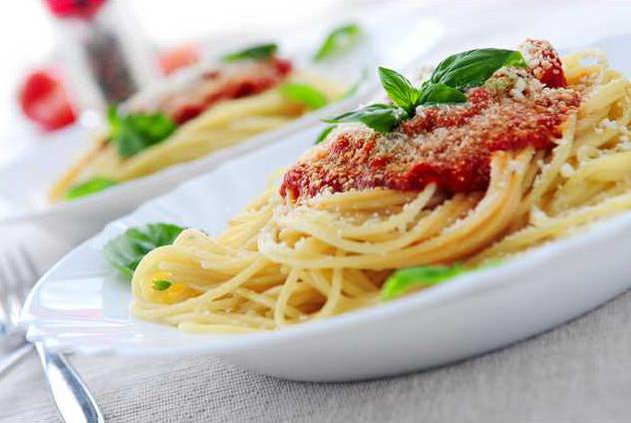Italian researchers say pasta eating is linked to a healthy body weight. Before you roll your eyes, know that an older study in the U.S. said much the same.
The first study, led by researchers at the University of Chicago in 2012, found that people who ate more fruit, pasta and rice had less body fat than people who ate more animal protein.
The latest research, published July 4 in the journal Nutrition & Diabetes, found that people who ate reasonable amounts of pasta had better body-mass indices and smaller waists.
Pasta eating, the report said, was associated with the healthful Mediterranean style of eating, which is one of three styles promoted by the U.S. dietary guidelines. People who ate pasta were more likely to eat other staples of a Mediterranean diet, such as onions, garlic, olive oil and cooked tomatoes, the researchers said. (Like asparagus and carrots, tomatoes are better for us when they're cooked, because more nutrients are released.)
In a report on the study, CNN noted that pasta, long a staple of long-distance runners on the eve of a race, has fallen out of favor in America in recent years. Many Americans see pasta as nutritionally vacant, but Italians still view it as the foundation of their food pyramid, CNN said.
In fact, a typical cup of regular pasta provides 6.7 grams of protein and small amounts of calcium and potassium. Whole-wheat, enriched pasta also has iron, B vitamins and fiber, CNN said.
Another pasta myth is that its origins are Italian. Many people think it originated in China; others claim the Etruscans created it in 400 BC.
Regardless, credit Thomas Jefferson for its popularity in America. While serving as the ambassador to France, Jefferson became enamoured of pasta which he called macaroni and ordered crates of it and a pasta maker sent to his home in the U.S. He later served it in the White House when he was president.
Of course, Jefferson and the other founding fathers didn't worry much about their weight, unlike the third of contemporary Americans who are obese. And the trim Italians eating pasta are likely dabbing it with olive oil, not coating it in butter and cheese.
There is one sure-fire thing you can do to make your family's pasta dinner even healthier and no, it's not serving it cold.
The British TV show "Trust Me I'm a Doctor" got lots of publicity in 2014 when it tested blood glucose levels of 10 people who ate fresh, cold or reheated pasta. Glucose levels were lower when people ate pasta that had been cooled, then reheated, leading researchers to conclude that less of it is digested.
But until there's a study of 10,000 people, not 10, there's an even more reliable route: Buy pasta that is 100 percent whole wheat and cook it al dente (firm, not mushy). As James Hamblin wrote recently in The Atlantic: "Eat whole grains instead of just their starchy white endosperm whenever possible, and a persons odds of health increase."
The first study, led by researchers at the University of Chicago in 2012, found that people who ate more fruit, pasta and rice had less body fat than people who ate more animal protein.
The latest research, published July 4 in the journal Nutrition & Diabetes, found that people who ate reasonable amounts of pasta had better body-mass indices and smaller waists.
Pasta eating, the report said, was associated with the healthful Mediterranean style of eating, which is one of three styles promoted by the U.S. dietary guidelines. People who ate pasta were more likely to eat other staples of a Mediterranean diet, such as onions, garlic, olive oil and cooked tomatoes, the researchers said. (Like asparagus and carrots, tomatoes are better for us when they're cooked, because more nutrients are released.)
In a report on the study, CNN noted that pasta, long a staple of long-distance runners on the eve of a race, has fallen out of favor in America in recent years. Many Americans see pasta as nutritionally vacant, but Italians still view it as the foundation of their food pyramid, CNN said.
In fact, a typical cup of regular pasta provides 6.7 grams of protein and small amounts of calcium and potassium. Whole-wheat, enriched pasta also has iron, B vitamins and fiber, CNN said.
Another pasta myth is that its origins are Italian. Many people think it originated in China; others claim the Etruscans created it in 400 BC.
Regardless, credit Thomas Jefferson for its popularity in America. While serving as the ambassador to France, Jefferson became enamoured of pasta which he called macaroni and ordered crates of it and a pasta maker sent to his home in the U.S. He later served it in the White House when he was president.
Of course, Jefferson and the other founding fathers didn't worry much about their weight, unlike the third of contemporary Americans who are obese. And the trim Italians eating pasta are likely dabbing it with olive oil, not coating it in butter and cheese.
There is one sure-fire thing you can do to make your family's pasta dinner even healthier and no, it's not serving it cold.
The British TV show "Trust Me I'm a Doctor" got lots of publicity in 2014 when it tested blood glucose levels of 10 people who ate fresh, cold or reheated pasta. Glucose levels were lower when people ate pasta that had been cooled, then reheated, leading researchers to conclude that less of it is digested.
But until there's a study of 10,000 people, not 10, there's an even more reliable route: Buy pasta that is 100 percent whole wheat and cook it al dente (firm, not mushy). As James Hamblin wrote recently in The Atlantic: "Eat whole grains instead of just their starchy white endosperm whenever possible, and a persons odds of health increase."








